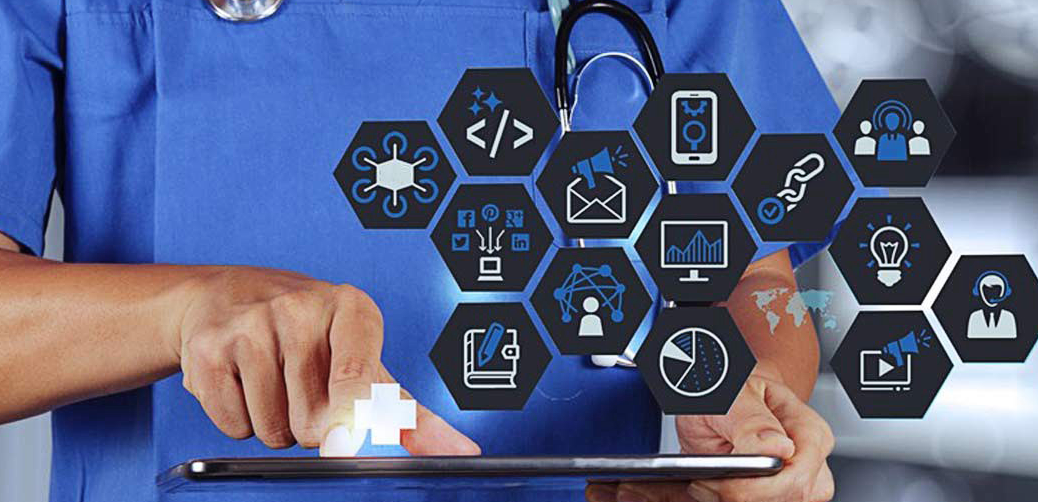Blockchain is a popular technology that has impacted nearly every industry and healthcare sector in the past years. It is a secure and most trusted digital ledger which has emerged as a new buzz in the technological world.
Blockchain is a digitally decentralized and public ledger that enables people to record transactions from many computers to prevent any detailed record from getting altered retroactively without causing any disturbance to other subsequent blocks.
Capabilities of Blockchain:
Security: Blockchain offers data storing in all the systems provided instead of just a centralized database, making it more secure and reliable.
Lower transaction costs: It does not include any third party, which allows peer to peer transactions that will automatically lower the transaction costs. It provides an authentic and verified transaction record.
Business models: Blockchain provides a phenomenal platform for new and conventional businesses by its innovative business models that lead to the growth and expansion of your company.
Genuine data: Once data is filled in the Blockchain, it cannot be changed even by system administrators and third parties.
Key factors of Blockchain that impacts Healthcare:
Although the global development of Blockchain in Healthcare is impressive, the CAGR growth between 2018-2024 will reach up to 70.45%. Here are Blockchain’s key factors, which lets us know more about its functioning and development in Healthcare.
- Decentralized System: This system enables the data to be more secure and safe by making it hack-proof. Hence, all hardware tends to run based on the hospital’s decentralized systems, providing a robust security network.
- Data source: It works on a single data source, which researchers can use to analyze a massive source of undisclosed information and data regarding specific groups of people in the healthcare department.
- Active monitoring: Blockchain can play an essential role in storing and updating essential patient data such as BP, sugar level in real-time by using IoT and wearables. It helps the doctors monitor patients at high risk and inform their family and friends about their health in an emergency.
- Cost-effective: The blockchain technology does not involve any third party and mediator, not even banks, which are generally interested in transferring data. This makes it an easier way to achieve significant cost-effectiveness in the healthcare department.
- Smart contract: It is a computer protocol that has the capability to verify, facilitates, and stimulate the negotiation process digitally. This will help maintain healthcare apps by a consistent rule to access patient data for various organizations.
There are many possible positive outcomes of Blockchain in the healthcare sector:
Drug supplies: The drug supply can be more secure due to the Blockchain’s immutability by preventing it from getting manipulated by so many people. This can be a reason for the distributors’ false drugs or the mediator from the place it gets manufactured and then coming to the wholesaler before distributing to the customers.
- Blockchain can help the manufacturers keep track of all the ingredients used in a drug ensuring all the medical precautions in a standardized manner.
- It offers the tracing ability of the counterfeit drugs, which provides healthcare and pharma organizations to get rid of these drugs and help get the source of counterfeiting.
- The integrity of all medical records, important information, and consent of patients is secure. So, the next time there is a need for the patients’ previous records, it will be very easy to find. The medical history can be stored in a blockchain that has genuine proof as a medical record of the patients, which cannot be manipulated or altered by any means. It provides significant support in the integrity of the medical record, which is critical for both medical and legal authorization.
- The medical research process gets more straightforward with the help of blockchain validated access to the patient’s data, which can be used to study the impact of any particular treatment over a massive number of data for various types of patients. These research studies provide a sustainable outcome, which results in the treatment methods for that group of patients.
- Blockchain introduces single patient identification, which does not lead to mismatch and duplication of the patient’s record. There are different schemes of different EHRs that can create big problems as it then brings new ways in which the simplest of data can be manipulated. But, with blockchain, whole data is hashed to a digital ledger. You are going to encounter so many addresses and keys while looking for addresses; even all of them will provide a single patient identification.
- It has smart contracts that define the terms and conditions of the agreement to the payer and the provider so that the time taken for claim settlements will get resolved as it follows the processing of claims in real-time.
- The business models of healthcare departments such as pharma companies, pharmacies, and various healthcare professionals can be done through real-time advancement, secured & accurate data, and other accessible patient data related to their conditions. Blockchain helps the professionals and doctors by updating them about the patient’s current situation and also guide them at the time of emergency by alerting.
Challenges for blockchain in healthcare:
Since blockchain is a new technology, there are neither many successful blockchain healthcare initiatives nor the process of establishment that owns the healthcare data to know who grants permission for sharing the data.
Conclusion:
Blockchain is a huge achievement which has crossed all the limitations of expectations in terms of security. It has tremendous advancement, which provides massive security and legally authorized data of the patients for healthcare. It allows databases to store, lowers transactions, and impacts the overall cost-effectiveness.
Blockchain verifies each data entry and archives all the transactions with the distributed network system. The blueprints related to the genetic information, patient’s medical data, and other important information from tests and clinical trials remain safe in the blockchain. It might take some time to get incorporated entirely in the healthcare department, but it will indeed create an impact one day.
SoftGrid Computers can help you ace your telemedicine efforts by building a healthcare software customized to your needs. Our experts have garnered immense experience in the field of healthcare software development, you can get on a call with them to discuss your requirements! Contact us here.

 Web and Full Stack
Web and Full Stack CMS and Frameworks
CMS and Frameworks Online Marketing
Online Marketing Cloud Services
Cloud Services ECommerce
ECommerce Mobile
Mobile



